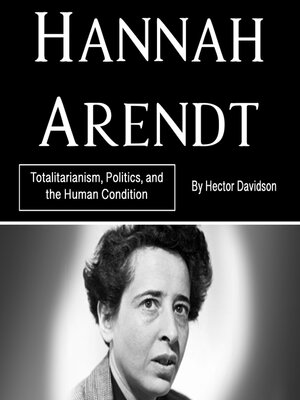Hannah Arendt
audiobook (Unabridged) ∣ Totalitarianism, Politics, and the Human Condition
By Hector Davidson

Sign up to save your library
With an OverDrive account, you can save your favorite libraries for at-a-glance information about availability. Find out more about OverDrive accounts.
Find this title in Libby, the library reading app by OverDrive.



Search for a digital library with this title
Title found at these libraries:
| Library Name | Distance |
|---|---|
| Loading... |
Hannah Arendt, one of the most influential political theorists of the 20th century, has had a profound impact on the way we understand totalitarianism, democracy, and the human condition. Born in 1906 in Germany, Arendt lived through the upheavals of the First and Second World Wars, the rise of totalitarian regimes, and the Holocaust. Her personal experiences, as well as her academic training, shaped her insightful reflections on the nature of political power, authority, and the dangers of mass society.
Arendt's legacy is complex and multifaceted. She is perhaps best known for her analysis of totalitarianism, particularly in her seminal work The Origins of Totalitarianism. In this text, she examined the roots of Nazi and Stalinist regimes, exploring how the breakdown of traditional political structures and the rise of mass movements created fertile ground for totalitarian rule. Her investigation into the mechanisms of such regimes, including their use of propaganda, terror, and ideology, continues to offer valuable insights into the nature of authoritarianism.
Equally important to Arendt's work is her exploration of the human condition and the role of politics in public life. In The Human Condition, she distinguished between labor, work, and action, highlighting the significance of active participation in political life as a means of realizing human freedom. For Arendt, politics was not simply a matter of governance or power struggles; it was a space in which individuals could engage in meaningful dialogue, debate, and action, thereby affirming their identity as free and equal citizens.







